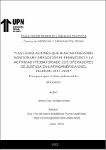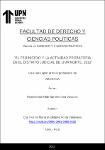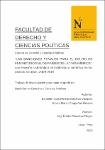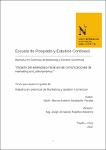Mostrar el registro sencillo del ítem
Las legislaciones que buscan prevenir, sancionar y erradicar el feminicidio y la actividad probatoria de los operadores de justicia en Latinoamérica en el periodo 2017–2021
| dc.contributor.advisor | Poma Valdivieso, Flor de María Madelaine | |
| dc.contributor.author | Hurtado Pittar, Jimmy Roy | |
| dc.date.accessioned | 2023-11-29T17:45:42Z | |
| dc.date.available | 2023-11-29T17:45:42Z | |
| dc.date.issued | 2023-06-12 | |
| dc.identifier.citation | Hurtado, J. R. (2023). Las legislaciones que buscan prevenir, sancionar y erradicar el feminicidio y la actividad probatoria de los operadores de justicia en Latinoamérica en el periodo 2017–2021 [Tesis de licenciatura, Universidad Privada del Norte]. Repositorio de la Universidad Privada del Norte. https://hdl.handle.net/11537/35218 | es_PE |
| dc.identifier.other | 364.15553 HURT 2023 | es_PE |
| dc.identifier.uri | https://hdl.handle.net/11537/35218 | |
| dc.description.abstract | La presente investigación tiene la finalidad de observar los modelos legislativos y la tipificación del feminicidio en países latinoamericanos como México, Colombia, Perú, Chile y Argentina, así como su repercusión en la labor de los operadores de justicia, principalmente la de las fiscalías, y su actividad probatoria. En él se realiza un análisis de cada legislación, tomando como base el enfoque de género, así como la claridad y precisión con que se ha tipificado, así como el accionar de cada Estado y de sus operadores de justicia. Utilizando el método cualitativo, basado en un análisis heurístico documental se advierten avances y retrocesos en su sanción, advirtiendo un estancamiento y posible retroceso en los países de Perú y México, así como su progreso en Colombia, aún a costa de denuncias de vulneración a los derechos humanos. Así mismo el ingreso de Chile, al modelo de enfoque de género y de Argentina que, con un mayor avance en el reconocimiento de la identidad de género y un sistema de protocolos más objetivo para el tratamiento de este delito, han logrado mantener detenida su tasa de feminicidios. Las diversas situaciones nos permiten concluir que aún existe resistencia de parte de algunos Estados a hacer uso de este nuevo paradigma de justicia que concibe el derecho a la equidad y la igualdad como derechos fundamentales y que la falta de leyes y protocolos más precisos y ejecutables se oponen al cumplimiento de esta Ley. | es_PE |
| dc.description.abstract | This research aims to observe legislative models and the classification of femicide in Latin American countries such as Mexico, Colombia, Peru, Chile and Argentina, as well as its impact on the work of justice operators, mainly that of prosecutors, and their evidentiary activity. In English it would be: "This research aims to observe legislative models and the classification of femicide in Latin American countries such as Mexico, Colombia, Peru, Chile and Argentina, as well as its impact on the work of justice operators, mainly that of prosecutors, and their evidentiary activity. In it, an analysis of each legislation is carried out, based on the gender approach, as well as the clarity and precision with which it has been typified, as well as the actions of each State and its justice operators. Using the qualitative method, based on a documentary heuristic analysis, advances and setbacks are observed in its sanction, warning of a stagnation and possible setback in the countries of Peru and Mexico, as well as its progress in Colombia, even at the cost of reports of human rights violations. Likewise, the entry of Chile into the gender approach model and Argentina, with greater progress in recognizing gender identity and a more objective protocol system for the treatment of this crime, have managed to keep their femicide rate detained. Likewise, the entry of Chile into the gender approach model and Argentina, with greater progress in recognizing gender identity and a more objective protocol system for the treatment of this crime, have managed to keep their femicide rate detained. The various situations allow us to conclude that there is still resistance on the part of some states to make use of this new paradigm of justice that conceives equity and equality as fundamental rights and that the lack of more precise and executable laws and protocols oppose the fulfillment of this law. | es_PE |
| dc.description.uri | Tesis | es_PE |
| dc.format | application/pdf | es_PE |
| dc.format | application/msword | es_PE |
| dc.language.iso | spa | es_PE |
| dc.publisher | Universidad Privada del Norte | es_PE |
| dc.rights | info:eu-repo/semantics/openAccess | es_PE |
| dc.rights.uri | https://creativecommons.org/licenses/by-nc-sa/3.0/us/ | * |
| dc.source | Universidad Privada del Norte | es_PE |
| dc.source | Repositorio Institucional - UPN | es_PE |
| dc.subject | Violencia | es_PE |
| dc.subject | Derechos humanos | es_PE |
| dc.subject | Violencia en la pareja | es_PE |
| dc.subject | Enfoque de género | es_PE |
| dc.subject | Feminicidio | es_PE |
| dc.subject | Tipificación del delito de feminicidio | es_PE |
| dc.subject | Operadores de justicia | es_PE |
| dc.subject | Gender focus | es_PE |
| dc.subject | Femicide | es_PE |
| dc.subject | Classification of the crime of feminicio | es_PE |
| dc.subject | Justice operator | es_PE |
| dc.title | Las legislaciones que buscan prevenir, sancionar y erradicar el feminicidio y la actividad probatoria de los operadores de justicia en Latinoamérica en el periodo 2017–2021 | es_PE |
| dc.type | info:eu-repo/semantics/bachelorThesis | es_PE |
| thesis.degree.grantor | Universidad Privada del Norte. Facultad de Derecho y Ciencias Políticas | es_PE |
| thesis.degree.level | Título Profesional | es_PE |
| thesis.degree.discipline | Derecho y Ciencias Políticas | es_PE |
| thesis.degree.name | Abogado | es_PE |
| dc.publisher.country | PE | es_PE |
| dc.subject.ocde | https://purl.org/pe-repo/ocde/ford#5.05.01 | es_PE |
| thesis.degree.program | Pregrado | es_PE |
| dc.description.sede | Los Olivos | es_PE |
| renati.advisor.dni | 25576850 | |
| renati.advisor.orcid | https://orcid.org/0000-0001-6992-9035 | es_PE |
| renati.author.dni | 07456922 | |
| renati.discipline | 421056 | es_PE |
| renati.juror | Vigil Ruiz, Vanessa | |
| renati.juror | Polar Cadillo, Jorge | |
| renati.juror | Mego Silva, Andres | |
| renati.level | http://purl.org/pe-repo/renati/level#tituloProfesional | es_PE |
| renati.type | http://purl.org/pe-repo/renati/type#tesis | es_PE |
| dc.relation.conformsto | 16% | es_PE |
Ficheros en el ítem
Este ítem aparece en la(s) siguiente(s) colección(ones)
-
Tesis [841]










